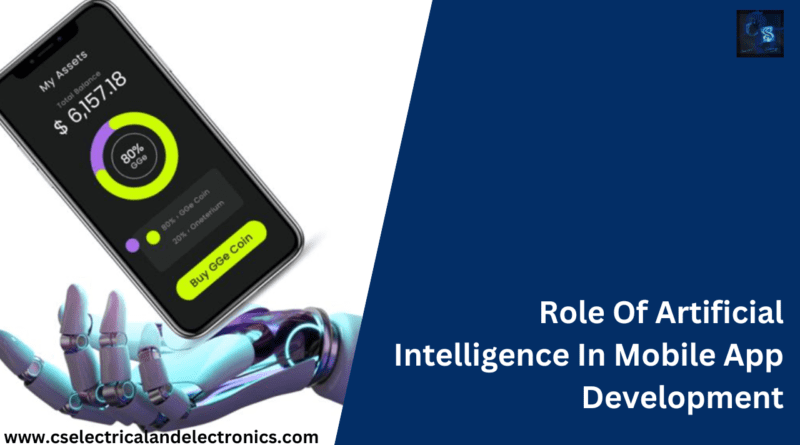Role Of Artificial Intelligence In Mobile App Development
Hello guys, welcome back to our blog. Here in this article, we will discuss the role of artificial intelligence in mobile app development, how to get started with it, and how it will be helpful for your business.
If you have any electrical, electronics, and computer science doubts, then ask questions. You can also catch me on Instagram – CS Electrical & Electronics.
Also, read the following:
- Types Of Testing Devices Used In Electrical Substations
- How To Convert A Website Into Android App Using Android Studio
- Top 50+ Different Types Of ECU Used In Heavy Vehicles, Buses
Role Of Artificial Intelligence In Mobile App Development
Introduction
In the digital world, Artificial Intelligence (AI) has become a game-changer. The integration of AI in app development is revolutionizing how businesses operate and engage with their customers. This article explores the potential of AI in mobile apps, the benefits it provides, and the process of implementing it in app development.
What is Artificial Intelligence?
Artificial Intelligence (AI) is a branch of computer science that aims to imbue software with the ability to analyze its environment using either predetermined rules and search algorithms or pattern-recognizing machine learning models and then make decisions based on those analyses.
AI can be classified into two main types:
1. Narrow or Weak AI: This type of AI is designed to perform a narrow task, such as voice recognition, recommendation systems, or image recognition. It is “weak” in the sense that it is limited to a specific task and doesn’t possess any genuine intelligence or self-awareness despite its ability to mimic human intelligence. Examples of Narrow AI include Siri, Alexa, and Google Assistant.
2. General or Strong AI: In contrast, General AI can understand, learn, adapt, and implement knowledge in a range of tasks. It is not limited to a specific task and possesses the ability to understand the context and make decisions based on it. The concept of strong AI goes beyond current capabilities, embodying machines that exhibit the full range of human intelligence. At this level, the AI could potentially perform any intellectual task that a human being can do.
Key Components of AI
To fully grasp the concept of AI, it’s essential to understand its key components:
- Machine Learning (ML): A subset of AI, ML enables machines to learn from past data or experiences without being explicitly programmed. It uses various algorithms to build mathematical models based on sample data (or “training data”) to make predictions or decisions.
- Deep Learning: A further subset of ML, deep learning mimics the functioning of the human brain to process data and create patterns used in decision-making. It utilizes structures known as artificial neural networks.
- Natural Language Processing (NLP): This component allows machines to understand and interact with human language. NLP enables AI to read, interpret, understand, and generate human language in a valuable way.
- Cognitive Computing: This field is about simulating human thought processes in a computerized model. It involves self-learning systems that use ML, pattern recognition, and NLP to mimic the way the human brain works.
- Computer Vision: This involves teaching computers to “see” and understand the content of digital images such as photographs and videos.
- Robotics: This domain involves the design and creation of robots that can interact with the physical environment.
Artificial Intelligence is a rapidly evolving field that promises to revolutionize various sectors, including healthcare, finance, transportation, and entertainment, among others. However, despite its potential, AI also presents significant ethical and societal challenges that need to be addressed.
What is App Development?
App development is the process of creating a computer program or a set of programs to perform different tasks that a business requires. It involves planning, creating, testing, and deploying an application on different platforms.
Why Develop AI-Integrated Apps in Business?
Developing AI-integrated apps in business can lead to increased efficiency, automation, improved customer experience, and boosted revenue. They can provide businesses with data-driven insights, automate processes, and personalize user experience.
Differences between AI Projects and Traditional Software Projects
AI projects and traditional software projects may seem similar at the surface level, as both involve programming and software development. However, there are fundamental differences in the approaches, processes, and outcomes between the two. Here are some of the key differences:
- Development Process: In traditional software development, developers often follow a clear, linear process (such as the Waterfall model) or iterative methodologies (like Agile or Scrum), which involve defining requirements, designing, coding, testing, and deploying. AI projects, on the other hand, usually follow a more exploratory process. This includes stages like problem definition, data collection and preprocessing, model selection and training, validation and testing, and deployment and monitoring. The results are not deterministic and the project may need to cycle through these stages multiple times as data changes or models are refined.
- Use of Data: AI projects are inherently data-driven. They rely heavily on the availability, quality, and volume of data for training the models. Decisions in AI projects are made based on patterns or insights derived from data. On the contrary, traditional software projects are logic-driven where developers write code that follows a set of predefined rules.
- Predictability: Traditional software projects are deterministic, where the same input will always produce the same output. With AI projects, the output isn’t as predictable and is probabilistic in nature, i.e., given the same input, the output might vary based on the learning of the AI model.
- Maintenance: Maintenance in traditional software projects involves bug fixing, upgrading systems, and adding new functionalities. In AI projects, maintenance includes updating and retraining models based on new data, evaluating model performance continually, and ensuring the model doesn’t “drift” from its expected accuracy over time.
- Skills Required: Traditional software projects require knowledge of various programming languages, software architecture, databases, etc. AI projects demand a different skillset including knowledge in machine learning algorithms, statistics, data analysis, and often a specific knowledge of AI frameworks and libraries.
- Testing: In traditional software projects, testing is about checking if the software behaves as expected for given inputs and conditions. In AI projects, testing is more complex as it involves validating the accuracy, reliability, and fairness of models, which could vary based on the input data.
- Error Handling: Errors in traditional software are usually due to bugs in the code and can be fixed by modifying the code. In AI projects, errors could be due to many factors including poor quality or insufficient quantity of training data, inappropriate model selection, or incorrect feature extraction, which might require revisiting the data or the model.
Understanding these differences is crucial to the successful execution of AI projects, as they require different strategies, resources, skills, and tools compared to traditional software projects.
Top of Form
The Potential of Artificial Intelligence in Mobile Apps
AI technology offers numerous opportunities when integrated into mobile apps:
i. Enhanced User Experience: AI can be used to offer personalized recommendations and content to users, thereby enhancing user engagement and satisfaction.
ii. Automated Operations: AI algorithms can automate various operations such as customer service, reducing the workload on staff.
iii. Increased Efficiency: AI can automate repetitive tasks, thus freeing up time for employees to focus on more complex tasks.
iv. Search Engine Optimization: AI can optimize the app content, making it more discoverable in app stores.
v. Increment of Automation Level: AI-powered apps can automate complex tasks that previously required human intervention.
vi. Automated Logical Reasoning: AI can use logical reasoning to make decisions, providing more accurate results.
vii. Automatic Reply Function: AI-powered chatbots can provide instant replies to user queries.
viii. AI & IoT Amalgamation: AI can work in synergy with the Internet of Things (IoT) to create smart devices that are more responsive and adaptive.
ix. Highly Personalized User Experience: AI algorithms can analyze user behavior and preferences to provide a highly personalized experience.
x. Enabling Real-Time Translation: AI can enable real-time translation in messaging apps, eliminating language barriers.
xi. AI-Powered Chatbots: AI chatbots can handle customer queries efficiently and at scale.
xii. Enhanced Security with Facial Recognition: AI can enhance app security through features like facial recognition and anomaly detection.
Key AI Uses in Mobile Apps
There are several uses of AI in mobile apps, including:
i. Chat Automation: AI can automate customer interactions, providing 24/7 customer service.
ii. Digital Assistance: AI-powered digital assistants can perform various tasks, such as setting reminders and making reservations.
iii. Security: AI can enhance app security by detecting and preventing fraudulent activities.
iv. Predictive Analytics: AI can analyze user behavior to predict future trends and preferences.
v. Personalization: AI can personalize the user experience by recommending relevant content based on user preferences.
How to Implement AI in Mobile Apps?
Implementing AI in mobile apps involves several steps:
i. Define Challenges to Address with AI: Identify the problems you want to solve with AI.
ii. Analyze Your Data: Collect and analyze the data needed for AI algorithms.
iii. Set the Metrics to Measure: Define the key performance indicators to measure the success of the AI implementation.s
iv. Implement the Solution: Develop and integrate the AI algorithms into the app.
v. Work on the Integrations: Ensure the AI features work seamlessly with other parts of the app.
vi. Monitor the Results: Continuously monitor and tweak the AI algorithms based on feedback and results.
FAQs
Here are the frequently asked questions
1. How can AI benefit my mobile app?
Ans. Ans. AI can enhance your mobile app in many ways, such as personalizing user experience, automating customer service through chatbots, enhancing security through anomaly detection, providing predictive analytics, and much more. For instance, real estate apps for innovative developments such as the Kingdom Valley can significantly benefit from AI integration. AI-powered features like predictive analytics can help potential investors assess property values, automated chatbots can answer customer inquiries around the clock, and personalization can deliver property recommendations tailored to each user’s unique preferences and needs.”
2. What are some examples of AI in mobile apps?
Ans. Some examples of AI in mobile apps include recommendation engines in e-commerce apps, AI-powered chatbots in customer service apps, personalized news feeds in news apps, and facial recognition in security apps.
3. What is the future of AI in mobile app development?
Ans. The future of AI in mobile app development looks promising, with advancements in areas such as natural language processing, machine learning, and predictive analytics. We can expect more sophisticated personalization, enhanced user experiences, and more efficient operations.
4. How does AI improve user experience in mobile apps?
Ans. AI improves user experience by offering personalized content and recommendations, providing instant customer service through chatbots, enabling voice-based searches, and much more.
5. Can AI improve the security of my mobile app?
Ans. Absolutely, AI can significantly enhance app security through features like facial recognition, behavior analysis, and anomaly detection, which can identify and prevent fraudulent activities.
6. How can AI be used to personalize the user experience in mobile apps?
Ans. AI can analyze user behavior and preferences to provide personalized content and recommendations. This can include products in an e-commerce app, news articles in a news app, or even personalized workout plans in a fitness app.
7. What are the challenges of implementing AI in mobile apps?
Ans. Some of the challenges include data privacy concerns, the need for large volumes of data for accurate results, the complexity of integrating AI technologies, and the need for constant monitoring and updating of AI models.
8. How can AI automate tasks in mobile apps?
Ans. AI can automate various tasks such as customer service via chatbots, content recommendation, user behavior analysis, security checks, and much more.
9. How does AI contribute to chat automation in mobile apps?
Ans. AI-powered chatbots can handle a variety of customer queries efficiently, provide instant responses, and operate 24/7, offering a better customer service experience.
10. What steps should I follow to implement AI in my mobile app?
Ans. Implementing AI in a mobile app requires a strategic and well-structured approach. Here are some essential steps to follow:
1. Define the Problem: Start by identifying and defining the specific problem or task you want AI to solve in your app. Whether it’s enhancing user experience, automating tasks, providing personalized content, or improving security, defining the problem will help determine the AI functionalities you need.
2. Understand the AI Requirements: Analyze the type of AI technology that would be suitable for your app based on the problem you’ve defined. This could include machine learning, natural language processing, image recognition, or predictive analytics, among others.
3. Gather and Prepare the Data: AI technologies require data to learn and function. Depending on the AI technology you choose, you’ll need to gather and prepare the relevant data.
11. Is AI helpful in the development of Real Estate Apps?
Ans. Absolutely, AI can significantly enhance the functionality and user experience of real estate apps. Talking of innovation and data, the best part is that Sky Marketing also utilizes the latest techniques to provide the best services to its respected customers for a better user experience.
Here’s how:
- Property Recommendations
- ChatbotsDocument Analysis
- Maintenance Prediction
- Predictive Analytics
- Facial Recognition
- Virtual Tours
- Leads Scoring
Conclusion
The integration of AI in mobile app development is not just a trend; it’s a significant shift that is changing the way businesses operate and engage with their customers. The potential of AI in mobile apps is immense, from enhancing user experience to automating operations, increasing efficiency, and even enhancing app security. With the right strategy and execution, businesses can leverage AI to create powerful mobile apps that offer an unparalleled user experience and drive business growth.
This was about the “Role Of Artificial Intelligence In Mobile App Development“. I hope this article may help you all a lot. Thank you for reading.
Also, read:
- 100+ C Programming Projects With Source Code, Coding Projects Ideas
- 1000+ Interview Questions On Java, Java Interview Questions, Freshers
- App Developers, Skills, Job Profiles, Scope, Companies, Salary
- Applications Of Artificial Intelligence (AI) In Renewable Energy
- Applications Of Artificial Intelligence, AI Applications, What Is AI
- Applications Of Data Structures And Algorithms In The Real World
- Array Operations In Data Structure And Algorithms Using C Programming
- Artificial Intelligence Scope, Companies, Salary, Roles, Jobs
Author Profile
- Chetu
- Interest's ~ Engineering | Entrepreneurship | Politics | History | Travelling | Content Writing | Technology | Cooking
Latest entries
 All PostsApril 19, 2024What Is Vector CANoe Tool, Why It Is Used In The Automotive Industry
All PostsApril 19, 2024What Is Vector CANoe Tool, Why It Is Used In The Automotive Industry All PostsApril 13, 2024What Is TCM, Transmission Control Module, Working, Purpose,
All PostsApril 13, 2024What Is TCM, Transmission Control Module, Working, Purpose, All PostsApril 12, 2024Top 100 HiL hardware in loop Interview Questions With Answers For Engineers
All PostsApril 12, 2024Top 100 HiL hardware in loop Interview Questions With Answers For Engineers All PostsMarch 22, 2024Driver Monitoring Systems In Vehicles, Working, Driver Sleepy Alert
All PostsMarch 22, 2024Driver Monitoring Systems In Vehicles, Working, Driver Sleepy Alert








